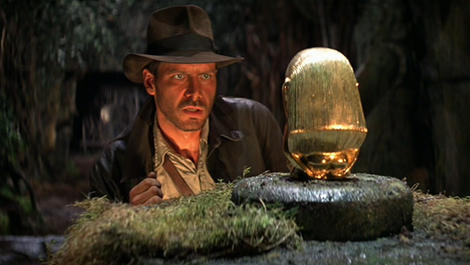Gender and Culture
The three philosophical readings that we will be looking at this week all try to show that many of our ethical ideas reflect a distinctively male point of view, and that the female perspective has tended to be overlooked or regarded as inferior. They don't suggest that any of this was done purposefully or consciously; rather, it's often the result of ways that we are conditioned by culture and society to think of men and women along certain stereotypical lines that tend to reinforce certain "masculine" traits as ideal, and certain "feminine" traits as inferior.
Before we turn to the readings, let's take a look at ways that such ideas can become ingrained in us so that we can get a sense of how conceptions of gender inequality can affect our thinking without us realizing it.
First, in this TED talk, Caroline Heldman analyzes how women are portrayed and judged in society according to their looks and she examines how this form of social judgment influences young girls and women.
This next video is a compilation of clips that display inherent sexism in the news media, as women are often judged by their age and looks rather than their intelligence and political acumen.
It's not just women that are stereotyped. In this TED talk, Colin Stokes examines how media and films represent manhood and the outcomes that result from these representations.
Finally, we broaden our view a bit to other cultures. The following documentary, "Prostitutes of God," examines a group of prostitutes in India who have been born into prostitution and dedicated to a fertility goddess. As you watch this film, think about how social ideals and structures often lock women into certain predefined categories. The film exemplifies the ways that negative attitudes toward women can be deeply rooted within in a culture, which might reinforce the urgency to take these kinds of things seriously within our own.
Not only does this present another example of the kind of phenomenon our readings will be pointing to, it also confronts us with some difficult questions that bring us back around to week 1's discussion of cultural relativism. Is this just "the way they do things," and something we have no business judging? Or do these represent real and deplorable violations of rights and ethical standards that apply to all of us, by virtue of our common humanity?
Further videos displaying examples of gender stereotyping and inequality can be found in the "recommended media" below. For now, though, we turn to the readings.
Feminist Ethics
Having seen the way that certain gender attitudes and inequalities are inculcated and reinforced in various ways, has this had an effect on the way we approach ethical questions? For instance, can females and males each have distinct sensitivities to features of a situation, ways of processing questions and facts, and distinctive insights?
If so, it's worth considering whether this distinctive feminine voice has tended to be overlooked or suppressed in our cultural choices and values, and how recognizing that might affect our individual and societal beliefs and judgments.
Our readings this week engage these questions.
The first reading tries to bring out some important differences between the ways that men and women respond to ethical situations. In her chapter "Images of Relationship" from her book In a different voice: Psychological theory and women’s development, Carol Gilligan (1982) presents her analysis of the differences between ethical responses in young boys and young girls and she interprets female responses through the lens of what has become known as “care ethics.”
As you read, think about how the differences between male and female responses relate to the moral theories that we have been considering, utilitarianism, deontology, and virtue ethics. Consider whether each theory is a "masculine" or a "feminine" ethic, or whether it involves elements of both. Is Gilligan correct to distinguish approaches to ethics in terms of gender?
Virginia Held (1990) tries to answer some of these questions in her essay "Feminist transformations of moral theory" by arguing that moral philosophy has by and large tended to reflect the masculine perspective. Since the earliest days of philosophy, the typical concerns, characteristics, and ways of thinking of males has set the standard for "human" virtue and morality, while the typical concerns, characteristics, and ways of thinking of females has tended to be regarded as subhuman, inferior, or even bad.
Taking these two articles together, what might a feminist perspective teach us about human relations, about virtuous conduct and character, and about the decisions we ought to make as moral agents?
A suggestion in the area of military issues is provided Nel Noddings (2010) in her essay "War and Violence". Noddings analyzes the relationship between masculinity, violence, and war and opposes a certain conception of masculine violence to maternal thinking in relation to these topics.
Does Nodding present some important insights, and if so, how might we as individuals and as a society respond?
Going Deeper
Recommended readings and media on stereotypes and subjugation
In Elizabeth Cady Stanton's (2007) witty and sardonic essay from 1875 entitled "Subjection of women," she presents an analysis of the social structures and ideas that have kept women in subjection to men. She also presents her own ideas about how women ought to be treated and how they should advocate for equal rights. You can find the essay in the book Elizabeth Cady Stanton, feminist as thinker: A reader in documents and essays with the library's Ebook collection.
The following videos present further examples of the ways that gender stereotypes are reinforced in various ways in our culture.
The Social Consequences
The next three resources, two videos and an essay, expose some of the social consequences of the kinds of images, stereotypes, and inequalities that we have been examining.
Because they are so commonplace and reinforced at a subconscious level, they often go unnoticed, or their significance unappreciated, unless something is so jarring that it opens things up in a new way. These next two videos try to do just that.
The first is a short but powerful film imagines a world in which the gender roles were reversed, and women were the dominant gender while men had to contend with sexism and sexual violence. While the film is French (with English subtitles) and takes place in France, the social conditions should be familiar to those of us in the United States. What effect does reversing the gender roles in this way have on the emotional impact of the experiences the film represents, and would it have the same impact if the gender roles were more "standard"? (Note that the film contains a small amount of nudity that is non-sexual and supports the message of the film.)
This next video is a short documentary about women who light themselves on fire (or are lit on fire by others) in order to escape their marriages or other abusive relationships. Again, it's disturbing and discomforting, but it's precisely these kinds of things that are sometimes needed to jar us out of the mindsets that we are used to.
Finally, in the essay entitled “Domestic Violence Against Women and Autonomy," Marilyn Friedman analyzes the relationship between women’s freedom and the inability of some women to escape the destructive cycle of domestic violence. Rather than portray women as weak or ignorant, Friedman outlines specific social and familial limitations that prevent women from leaving these relationships. This essay can be found in the book Autonomy, Gender, Politics, which is in the Ashford University Library Ebook Collection.
Web Resources
We have only scratched the surface of these complex and challenging themes, and these two websites have a multitude of resources for going deeper.
Hinman, L. (n.d.). Gender and Ethical Theory.
Ethics Updates. Retrieved from http://ethics.sandiego.edu/theories/Gender/index.asp
Hinman, L. (n.d.). Gender and Sexism. Ethics Updates. Retrieved from http://ethics.sandiego.edu/Applied/Gender/index.asp
Beyond Gender
Having considered the question of gender equality and the ways in which it is undermined through various cultural attitudes and practices, and even philosophy, we can extend those insights to other sources of difference, such as race. Many of these same phenomena apply in similar ways when looking at racial inequality.
For a start, here are two examples of the ways that, like gender stereotypes, racial stereotypes may become entrenched through their forms of representation in the media.



